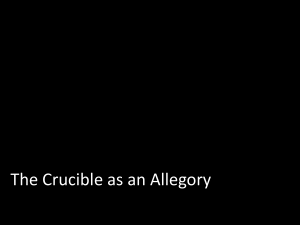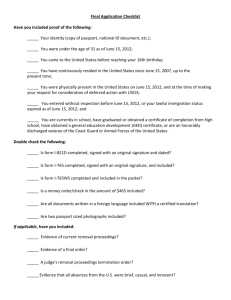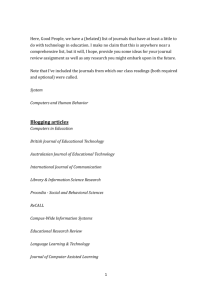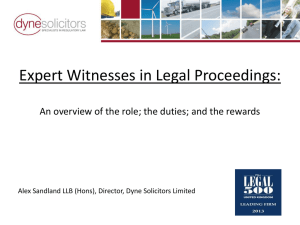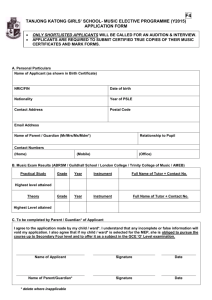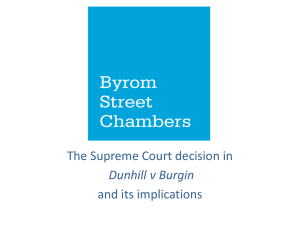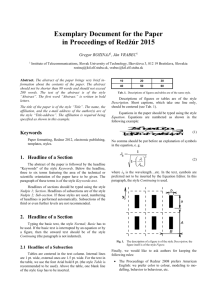Youth Court (Children`s Protection) Rules 2012
advertisement
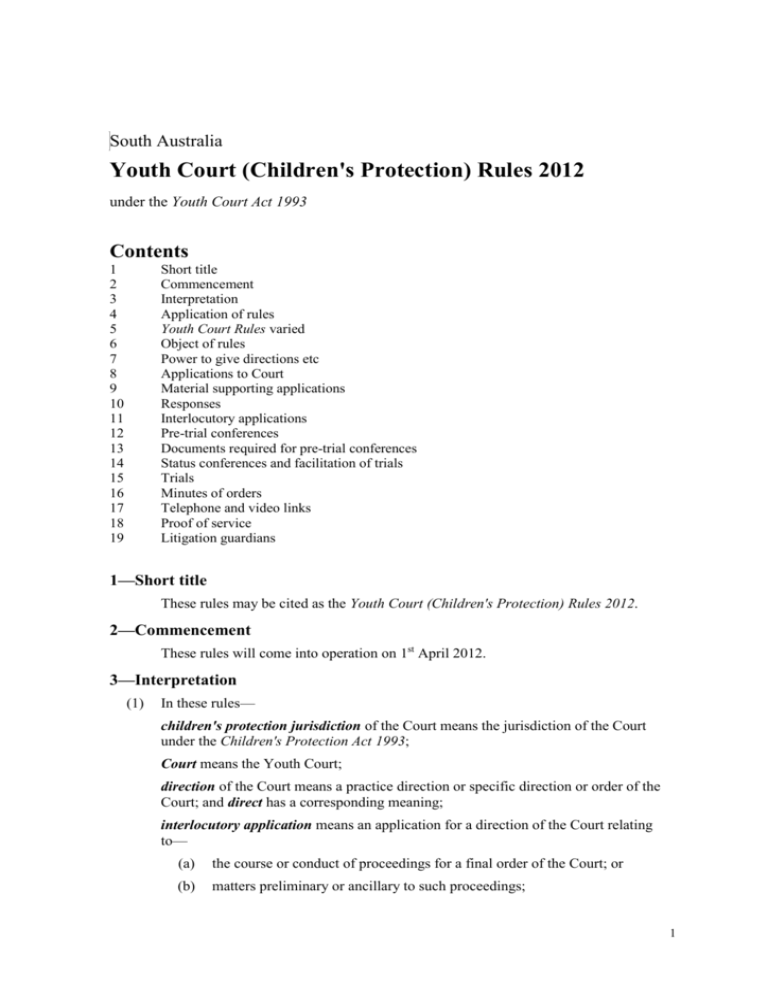
South Australia Youth Court (Children's Protection) Rules 2012 under the Youth Court Act 1993 Contents 1 2 3 4 5 6 7 8 9 10 11 12 13 14 15 16 17 18 19 Short title Commencement Interpretation Application of rules Youth Court Rules varied Object of rules Power to give directions etc Applications to Court Material supporting applications Responses Interlocutory applications Pre-trial conferences Documents required for pre-trial conferences Status conferences and facilitation of trials Trials Minutes of orders Telephone and video links Proof of service Litigation guardians 1—Short title These rules may be cited as the Youth Court (Children's Protection) Rules 2012. 2—Commencement These rules will come into operation on 1st April 2012. 3—Interpretation (1) In these rules— children's protection jurisdiction of the Court means the jurisdiction of the Court under the Children's Protection Act 1993; Court means the Youth Court; direction of the Court means a practice direction or specific direction or order of the Court; and direct has a corresponding meaning; interlocutory application means an application for a direction of the Court relating to— (a) the course or conduct of proceedings for a final order of the Court; or (b) matters preliminary or ancillary to such proceedings; 1 Youth Court (Children's Protection) Rules 2012 the term includes an application for an order that the Court is empowered to make on an adjournment of proceedings for a final order of the Court and any application that the Court directs be treated as interlocutory for the purposes of these rules; investigation and assessment application means an application for orders of the Court under section 21(1) of the Children's Protection Act 1993; working day means a day other than a Saturday or a Sunday or other public holiday. (2) In these rules, a reference to an appropriate form for an application to the Court is a reference to a form specified by the Court, by practice direction, for applications of the relevant kind, or a form approved or accepted by the Court or the Registrar in the particular case. (3) In these rules, a reference to service of a document on the other parties is a reference to service of the document on the persons required to be served under the Children's Protection Act 1993, or required to be served by direction of the Court. 4—Application of rules These rules apply to the children's protection jurisdiction of the Court. 5—Youth Court Rules varied (1) The Youth Court Rules are varied by deleting Section D (comprising rules 23.00 to 36.00 and the headings immediately preceding those rules). (2) The Youth Court Rules, as so varied, continue to apply according to their terms to the children's protection jurisdiction of the Court (as well as to other jurisdictions of the Court). 6—Object of rules The object of these rules is the fair, effective, expeditious and efficient conduct of the proceedings of the Court. 7—Power to give directions etc The Court may, in any proceedings, if it considers it appropriate to do so in particular circumstances, do either or both of the following: (a) give directions as to the practice and procedure to be followed in the circumstances; (b) dispense with compliance with a provision of these rules (including a provision governing the exercise of a power of the Court). 8—Applications to Court 2 (1) This rule applies to any application to the Court other than an interlocutory application. (2) An application must— (a) be in writing in an appropriate form; and (b) state the orders that are sought; and (c) state the statutory provision under which each such order might be made; and (d) state the grounds of the application; and Youth Court (Children's Protection) Rules 2012 (e) include particulars of the factual allegations or circumstances relied on to make out the grounds of the application; and (f) be signed by the applicant, or on the applicant's behalf by the applicant's legal representative. (3) In case of an application seeking a care and protection order, if an order sought is for the custody or guardianship of the child and no family care meeting has been held in respect of the alleged risk to child, the application must state the reasons why a family care meeting has not been held. (4) All statements and particulars in an application must be in plain language, and set out and expressed clearly, specifically and succinctly. (5) If multiple or alternative orders are sought in an application, the application must indicate this clearly and, for each such order, link the grounds and supporting statements and particulars relevant to that order clearly and specifically to that order. 9—Material supporting applications (1) An application to which rule 8 applies must be supported by material that sufficiently sets out the evidence on which the application is based. (2) Material in support of an application may be in the form of— (a) affidavits (including annexures); or (b) expert reports; or (c) chronologies of significant events; or (d) subject to a direction of the Court, other documentary evidence. (3) Material in support of an application must be filed in the Court and, unless the Court directs otherwise, served on the other parties. (4) The following provisions apply in relation to an application other than an investigation and assessment application: (5) (a) subject to subrule (3), material in support of the application must be filed in the Court and served on the other parties at least 10 working days before the pre-trial conference, or thereafter only with leave, and on such terms as the Court directs; (b) leave to file further material may be sought orally, at any stage of the proceedings; (c) subject to subrule (3), material filed in support of the application at any stage of the proceedings must be served on the other parties at least 2 working days before the next date for hearing in the proceedings. In the case of an application seeking a care and protection order in respect of a child in respect of whom there has been a previous care and protection order, the material in support of the application must include— (a) a document reporting the outcomes of any review meetings conducted during the operation of the previous order; and (b) copies of any care plans implemented, or sought to be implemented, during the operation of the previous order; and 3 Youth Court (Children's Protection) Rules 2012 (c) a document reporting the extent to which each party has complied with requirements or undertakings applicable to the party under the previous order. 10—Responses (1) This rule applies to any application to the Court other than— (a) an investigation and assessment application; or (b) an interlocutory application; or (c) an application of a kind excluded from the application of this rule by the Court by practice direction. (2) A party to an application who opposes the application in whole or part must file a response in the Court and serve the response on the other parties at least 5 working days before the pre-trial conference. (3) A response to an application must— (a) be in writing in an appropriate form; and (b) state clearly the order or orders sought in the application that are opposed and any order that is not opposed; and (c) if an order is proposed as an alternative to an order sought in the application, indicate that clearly and specify the proposed order and which order it would replace; and (d) in relation to each ground of the application, state whether the ground is— (e) (f) 4 (i) admitted, or (ii) disputed; or (iii) not admitted, but not disputed for the purposes of the determination of the application; and in relation to each separate particular of a factual allegation in the application, state whether the particular is— (i) admitted, or (ii) disputed; or (iii) not admitted, but not disputed for the purposes of the determination of the application; and if a ground or particular is disputed, state briefly the manner in which the ground or particular is disputed. (4) A response should be supported by material that provides evidence of the respondent's version of events or of any matter relevant to the determination of the application. (5) Material in support of a response may be in the form of— (a) affidavits (including annexures); or (b) expert reports; or (c) chronologies of significant events; or (c) subject to a direction of the Court, other documentary evidence. Youth Court (Children's Protection) Rules 2012 (6) Material in support of a response must be filed in the Court and served on the other parties at least 5 working days before the pre-trial conference, or thereafter only with leave, and on such terms as the Court directs. (7) Leave to file further material may be sought orally, at any stage of the proceedings. (8) Material filed in support of a response, at any stage of the proceedings, must be served on the other parties at least 2 working days before the next date for hearing in the proceedings. (9) The Court will make such determinations based on the contents of a response, or the failure to file a response, as the Court considers appropriate, and proceed accordingly, subject to the provisions of the Children's Protection Act 1993. 11—Interlocutory applications (1) This rule does not apply to an application of a kind excluded from the application of this rule by the Court by practice direction. (2) An interlocutory application is to be in an appropriate form, accompanied by an affidavit evidencing the grounds on which the application is being made. (3) Nothing prevents an interlocutory application from being combined with an application for a final order of the Court. (4) The applicant must serve a copy of the application (and accompanying documents) on the other parties as soon as practicable after it is filed in the Court, but not later than 2 working days before the next date for hearing in the proceedings. (5) However, service on other parties is not required if the application does not affect the interests of other parties. (6) The Court may, on conditions the Court considers appropriate, dispense with a requirement of this rule— (a) if the urgency of the case so requires; or (b) by consent of the parties; or (c) if for any other reason the Court considers it appropriate to do so. Example— The Court might permit a party to make an interlocutory application orally without service on the other parties if it considers it appropriate to do so in the circumstances of the case. (7) (8) The Court may determine an interlocutory application without hearing oral submissions from the parties if— (a) the application is not contentious; or (b) the Court decides on the application of a party to determine the application on the basis of written submissions. On an interlocutory application, the Court may give directions relating to the proceedings irrespective of whether the applicant has asked for such directions in the application. 5 Youth Court (Children's Protection) Rules 2012 12—Pre-trial conferences (1) This rule applies to any application to the Court other than— (a) an investigation and assessment application; or (b) an interlocutory application; or (c) an application of a kind excluded from the application of this rule by the Court by practice direction. (2) Defended applications will be listed for pre-trial conference with the goal that, so far as is practicable, each conference is held within 6 weeks from the filing of the application. (3) If matters remain in dispute at the end of a pre-trial conference, the application concerned will be allocated a trial date, and a status conference date. (4) The Judicial Officer presiding over a pre-trial conference may, subject to section 42 of the Children's Protection Act 1993, determine what matters are in dispute for the purposes of the trial and direct that the trial be limited to such matters. 13—Documents required for pre-trial conferences A party to an application listed for pre-trial conference must, at least 2 working days before the date fixed for the pre-trial conference, file in the Court, and serve on other parties— (a) a list of all witnesses to be called by the party at the trial; and (b) copies of reports of any proposed expert witnesses; and (c) a synopsis of the evidence of any other proposed witnesses. 14—Status conferences and facilitation of trials 6 (1) A status conference may be held before the trial of a defended application. (2) A status conference will, if practicable, be presided over by the Judicial Officer who is to hear the trial. (3) At a status conference, the Court may give directions— (a) requiring a party (normally the Minister or the Chief Executive) to prepare and distribute trial books or chronologies of significant events; or (b) limiting the issues to be determined at the trial; or (c) appointing a party dux litis in relation to issues to be determined at the trial; or (d) requiring or relating to the discovery, inspection and copying of evidentiary material; or (e) enabling non-parties to be present or participate at the trial; or (f) arranging for the interviewing of a child by the trial Judicial Officer; or (g) requiring the concurrent calling of expert witnesses; or (h) arranging for the taking of views; or Youth Court (Children's Protection) Rules 2012 (4) (5) (i) arranging for the taking of evidence by telephone link, video link or other medium; or (j) otherwise facilitating the conduct of the trial. Unless the Court directs otherwise, a trial book must— (a) contain the application and all material filed by parties in the proceedings; and (b) be provided to the Court and other parties at least 2 working days before the trial. Any such direction may, in any event, be given before or at the trial, 15—Trials A trial will be conducted, as far as practicable, on the basis that— (a) each party’s case is substantially contained in documentary material filed in accordance with these rules, and incorporated in the trial book; and (b) examination-in-chief of witnesses avoids undue repetition of matters contained in the filed material and is limited to necessary and reasonable explanation, correction or supplementation of the filed material and to eliciting responses to, or comments on, another party’s case. 16—Minutes of orders (1) This rule applies to any interim or final order made by the Court on an application, but does not apply to a purely procedural direction. (2) Subject to any direction of the Court to the contrary, the applicant must prepare minutes of the order and provide them to the Court at the hearing at which the order is made, or cause them to be filed in the Court within 2 working days of the making of the order. 17—Telephone and video links (1) In appropriate cases, the Court will facilitate the appearance of parties or counsel via telephone link or video link, or other medium. (2) A party wishing to appear via link must provide adequate notice and adequate information to the Court to enable arrangement of the link. (3) In the ordinary course, a telephone link will be via a landline, not a mobile telephone; and will be from a courthouse, State Government office, or other appropriate facility. 18—Proof of service (1) If an application or other document is required to be served on the other parties, the Court may decline to consider the application or document until proof of service of the application or document on the other parties has been filed in, or produced to, the Court. (2) Proof of service of an application or document may consist of an affidavit made by the person who served the application or document setting out— (a) the date, time and place of service; and (b) how the person to be served was identified; and 7 Youth Court (Children's Protection) Rules 2012 (c) (3) how service was effected. The Court may, however, require oral evidence of service. 19—Litigation Guardians (1) If the Court is satisfied that a party, other than a child the subject of proceedings, is incapable by reason of a disability of adequately conducting the proceedings, then the Court may appoint a litigation guardian to conduct the proceedings on behalf of the party. (2) The litigation guardian is responsible for the conduct of the proceedings on behalf of the party under a disability and may take any step in the proceedings that such party might have done if of full capacity. (3) The Court may appoint a person as a litigation guardian if the person: (a) is an adult; (b) has no interest in the proceedings adverse to the interest of the party needing the litigation guardian, or has some lawful authority to manage or administer the party's affairs; (c) can fairly and competently conduct the proceedings on behalf of the party and (d) has consented to act as the litigation guardian. (4) The Court may require a litigation guardian seeking a consent order on behalf of the party needing the litigation guardian to satisfy the Court that the order is in the party's best interests. (5) A party who becomes aware that another party is a person to whom this rule may apply, and is not represented by a litigation guardian, must inform the Court of that fact. (6) The Court may remove a litigation guardian upon any reasonable ground and may permit or appoint some other person to be the litigation guardian. Made by the Judges and Magistrates who are members of the principal judiciary of the Youth Court: Stephen McEwen, Senior Judge of the Court, .......................................................... Kelvyn Prescott, Judge of the Court, ......................................................................... Ms Penny Eldridge, Magistrate of the Court, ........................................................... Ms Lydia Makiv, Magistrate of the Court, ............................................................... 8
